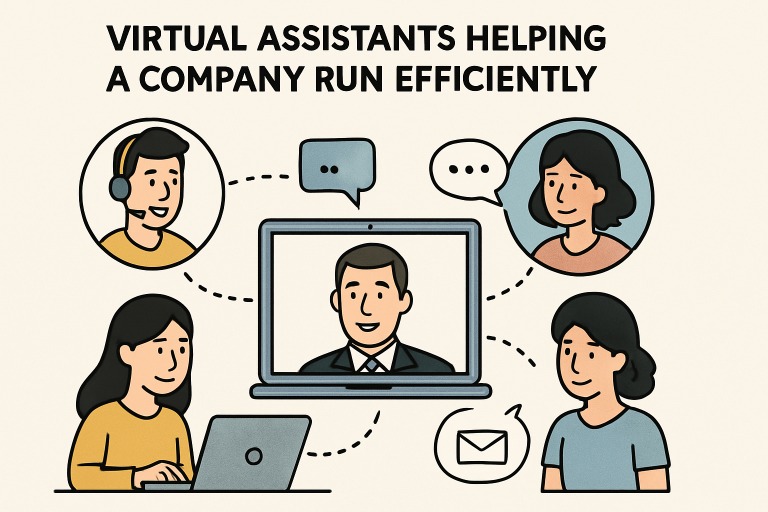Contents
Key Takeaways
- Virtual assistants can significantly reduce operating costs by removing physical workspace needs and overhead.
- Productivity rises as VAs efficiently handle repetitive or time-intensive tasks, enabling in-house teams to focus on higher-value activities.
- They offer access to various skills without rigid employment commitments, making them ideal for market agility.
- VAs empower companies with flexibility and scalability, efficiently supporting rapid growth and downturns.
- Customer service improves with always-available, professional support across every communication channel.
Table of Contents
- Introduction
- Reducing Operational Costs
- Enhancing Productivity
- Access to Specialized Skills
- Flexibility and Scalability
- Improving Customer Service
- Case Studies
- Conclusion
Introduction
In today’s fast-paced digital landscape, companies constantly seek strategies that drive efficiency while minimizing costs. One solution rapidly gaining ground is the adoption of virtual assistants (VAs) for diverse business functions. Whether it’s a growing startup or an established enterprise, leveraging remote professionals can give organizations the competitive edge they need. If you are considering this innovative solution for your business, working with an experienced agency for virtual assistant support can substantially improve outcomes and scalability.
The value of VAs extends well beyond cost savings; these remote experts handle everything from administrative duties to specialized digital tasks, freeing up core teams for essential projects. As remote work trends upward and digital transformation accelerates, VAs enable businesses to adapt quickly and operate more flexibly. This shift is streamlining workflows and unlocking new growth opportunities across many industries.
As the modern workforce grows increasingly decentralized, virtual assistants are a bridge to renewed productivity, focus, and customer satisfaction. Their services provide businesses with the agility to meet market demands, enhance operational efficiency, and augment in-house talent with specialized know-how. For leaders aiming to thrive in this new economy, adopting VA solutions is becoming less of a trend and more of a necessity.
Adopting virtual assistants streamlines business operations, drives customer engagement, and helps organizations outperform competitors in a crowded market. In the sections below, we’ll explore the core benefits, real-world examples, and crucial considerations of integrating virtual assistants into your business strategy.
Reducing Operational Costs
One primary reason businesses invest in virtual assistants is the remarkable reduction in day-to-day operating expenses. By working virtually, VAs eliminate the need for office space, utility bills, equipment purchases, and other costs that typically accompany traditional hiring. Instead, organizations can pivot financial resources toward core business development and growth initiatives. According to a study by CNBC, many workers are willing to accept a pay cut to work from home, indicating the cost-effectiveness of remote work arrangements.
Enhancing Productivity
Productivity is the cornerstone of successful businesses, and VAs are instrumental in boosting it. These professionals seamlessly manage recurring tasks such as inbox management, scheduling, travel arrangements, and bookkeeping. As VAs handle administrative burdens, core employees can focus on mission-critical objectives, creative projects, and customer-facing roles.
Studies show that organizations relying on virtual assistants often see a reduction in turnaround time and an increase in task completion accuracy. By distributing responsibilities efficiently, teams experience fewer bottlenecks and operate with improved momentum, supporting overall business objectives and agility.
Access to Specialized Skills
Today’s VAs is not limited to basic administrative tasks. Many bring expertise in digital marketing, bookkeeping, social media management, data analysis, and customer support. This gives businesses immediate access to a broader talent pool without hiring full-time specialists. For startups and small enterprises, it’s a gateway to expert-level performance without substantial salary commitments.
The process of sourcing and onboarding experts via virtual assistant services is simplified, with many platforms offering pre-vetted talent to fill skill gaps on demand. As reported by CNBC, remote jobs paying over $100,000 are in high demand, reflecting the value placed on specialized skills in the remote workforce.
Flexibility and Scalability
Adapting quickly to market changes is essential in today’s volatile environment. Virtual assistants provide unmatched flexibility, allowing businesses to scale their workforce in response to seasonal spikes, special projects, or changes in business focus. This flexible staffing model helps organizations keep overheads low during slower periods and ramp up capacity when demand surges, all without the confines of traditional hiring or layoffs.
This agility can be the spark that allows a business to capture new opportunities something especially vital for companies experiencing rapid growth or shifting their strategies in real time.
Improving Customer Service
A strong customer experience is non-negotiable for businesses aiming for growth and loyalty. Virtual assistants efficiently manage customer touchpoints through phone, chat, or email, providing instant, round-the-clock responses and professional care. VAs decrease wait times and improve overall customer satisfaction by increasing responsiveness and handling high-volume inquiries.
As customer expectations for instant, expert support climb, utilizing a VA can differentiate between retaining and losing clients in a competitive marketplace.
Case Studies
Delegating for Growth
Take the example of a consultancy owner buried in administrative overwhelm. Hiring a skilled virtual assistant freed up countless hours previously spent on scheduling and communications. This newfound bandwidth allowed the owner to build new client relationships, develop services, and ultimately increase revenue.
Creative Solutions with Content-Specialized VAs
In another scenario, a marketing agency struggling to maintain content production brought on a VA with a background in copywriting and SEO. Not only did quality improve, but traffic to the company’s website surged, and their digital reputation soared without a content team’s long-term expense.
Conclusion
Integrating virtual assistants into business operations empowers organizations to drive cost efficiency, elevate productivity, access cutting-edge skills, and deliver superior customer service all with agility and adaptability that traditional hiring can’t match. As the world of work and business continues to evolve, the ability to tap into a global pool of talent on demand is set to become a defining feature of successful, forward-thinking enterprises.

